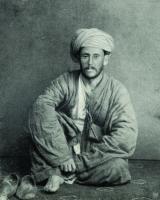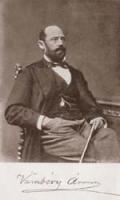Arminius Vámbéry
(1832-1913)

Arminius Vámbéry was a Hungarian Turkolog and traveler. He was born in Svätý Jur (now in Slovakia; in Hungarian: Szentgyörgy), former part of Kingdom of Hungary, into a poor Jewish family. Vámbéry was 1 year old when his father died and the family moved to Dunaszerdahely, Kingdom of Hungary. He attended the school in Dunaszerdahely until the age of twelve and showed a remarkable aptitude for learning languages. He was forced to walk with crutches because of a congenital disorder and eventually had to leave school due to difficult financial circumstances. He worked briefly as a tailor's assistant, but after becoming tutor to the son of the village innkeeper.
By the age of sixteen, he had a good knowledge of Latin, French, and German. He was also rapidly acquiring English, the Scandinavian languages, Russian, Serbian, and other Slavic languages.
Vámbéry was especially attracted by the literature and culture of the Ottoman Empire including Turkey. By the age of twenty, Vámbéry had learned enough Ottoman Turkish to enable him to go, through the assistance of Baron Joseph Eötvös, to Constantinople and establish himself as a private tutor of European languages.
About this time he was elected a corresponding member of the Hungarian Academy of Sciences in recognition of his translations of Ottoman historians.
After spending about a year in Constantinople, he published a German-Turkish dictionary in 1858. Later, he also published various other linguistic works. He also learned some twenty other Turkish languages and dialects. Returning to Budapest in 1861, he received a stipend from the academy, and in the autumn of the same year, disguised as a Sunni dervish, and under the name of Reshit Efendi, he set out from Constantinople. His route lay from Trebizond on the Black Sea to Tehran in Persia, where he joined a band of pilgrims returning from Mecca, spending several months with them traveling across Central Iran.
Throughout this time, he succeeded in maintaining his disguise as "Reshit Efendi," so that upon his arrival at Khiva he managed to keep up appearances during interviews with the local khan. Together with his band of travelers, he then crossed Bokhara and arrived at Samarkand. Initially, he aroused the suspicions of the local ruler, who kept him in an audience for a full half-hour. Vámbéry managed to maintain his pretences, and left the audience laden with gifts.
This was the first journey of its kind undertaken by a Western European; and since it was necessary to avoid suspicion, Vámbéry could not take even fragmentary notes, except by stealth. He returned to Europe in 1864. That following June, he paid a visit to London, where he was treated as a celebrity because of his daring adventures and knowledge of languages. That same year, he published his Travels in Central Asia, based on the few, furtive notes he was able to make while traveling with the dervishes. Returning to Hungary, Vámbéry was appointed professor of Oriental languages at the University of Budapest in 1865, retiring in 1905. He died in Budapest.
Furthermore, he enthusiastically advocated the theory of a close Turkish-Hungarian linguistic relationship, provoking a harsh scientific and political debate in Hungary. Vámbéry argued that the similarities between Turkish and Hungarian pointed to a common origin for the two languages in Northern Asia. This theory was opposed by followers of the Finno-Ugric theory of the origins of Hungarian, who gradually triumphed in Hungary but not in Turkey. In Turkey, Hungarian and Turkish are still considered as two branches of the same language family, the Ural–Altaic.

